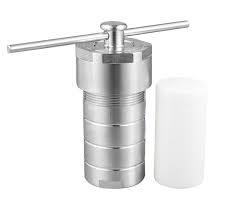Understanding the Benefits and Applications of Stainless Steel Autoclave Reactors in Life Sciences
Release time:
2025-05-26
Stainless steel autoclave reactors are essential tools in various scientific and industrial processes. They are specifically designed to withstand high pressures and temperatures, making them ideal for conducting chemical reactions that require strict control of conditions. One of the primary advantages of using stainless steel in these reactors is its exceptional resistance to corrosion, which is
Stainless steel autoclave reactors are essential tools in various scientific and industrial processes. They are specifically designed to withstand high pressures and temperatures, making them ideal for conducting chemical reactions that require strict control of conditions. One of the primary advantages of using stainless steel in these reactors is its exceptional resistance to corrosion, which is crucial when working with aggressive chemicals and solvents.
These reactors are commonly employed in the life sciences sector for processes such as sterilization, fermentation, and synthesis of bioactive compounds. Their robust construction ensures that they can handle the rigorous demands of high-pressure applications, which is often necessary in biochemical processes. The use of stainless steel also means that these reactors are easy to clean and maintain, adhering to the stringent hygiene standards often required in laboratory settings.

A significant benefit of using stainless steel autoclave reactors is their ability to provide uniform heat distribution. This is vital in reactions that require precise temperature control to ensure optimal yield and quality of the final product. Additionally, the design of these reactors often includes features such as pressure gauges and temperature sensors, allowing for real-time monitoring of reaction conditions. This capability aids researchers and technicians in making informed decisions throughout the reaction process.
Moreover, stainless steel autoclave reactors can be customized to meet specific research needs. They can vary in size and configuration, accommodating different scales of production, from small lab-scale experiments to larger industrial applications. This versatility is particularly advantageous for research institutions and companies focusing on drug development, where processes may need to be adjusted frequently based on experimental results.
In conclusion, stainless steel autoclave reactors represent a vital component in the life sciences industry. Their durability, chemical resistance, and ability to maintain precise control over reaction conditions make them indispensable for a wide range of applications. As research continues to advance, the role of these reactors will undoubtedly expand, paving the way for new discoveries and innovations in the life sciences field. By understanding the capabilities and benefits of stainless steel autoclave reactors, professionals can better leverage these tools to enhance their research and development efforts.
Latest News
Exploring the Benefits and Applications of Stainless Steel Autoclave Reactors in Life Sciences
Stainless steel autoclave reactors are essential instruments in the life sciences sector, particularly for applications requiring high-pressure and high-temperature conditions. These reactors are designed to facilitate chemical reactions, biological experiments, and material syntheses while ensuring safety and effectiveness. Their robust construction from stainless steel offers numerous advantages
2025-05-28
The Critical Role of Stainless Steel Autoclave Reactors in Advancing Pharmaceutical Development
The Critical Role of Stainless Steel Autoclave Reactors in Advancing Pharmaceutical Development Introduction to Stainless Steel Autoclave Reactors In the pharmaceutical industry, the development of drugs and therapies relies heavily on advanced technology and precision equipment. One of the most significant pieces of equipment in this landscape is the **stainless steel autoclave reactor**. These r
2025-05-27
Understanding the Benefits and Applications of Stainless Steel Autoclave Reactors in Life Sciences
Stainless steel autoclave reactors are essential tools in various scientific and industrial processes. They are specifically designed to withstand high pressures and temperatures, making them ideal for conducting chemical reactions that require strict control of conditions. One of the primary advantages of using stainless steel in these reactors is its exceptional resistance to corrosion, which is
2025-05-26
Why You Should Consider High Pressure Autoclave Reactors for Your Next Project
The Unmatched Efficiency of High Pressure Autoclave Reactors High pressure autoclave reactors have revolutionized the chemical engineering landscape, making them indispensable in various industries, including pharmaceuticals, polymers, and specialty chemicals. With their capability to operate under elevated pressures and temperatures, these reactors facilitate unique chemical reactions that trad
2025-05-25
Understanding High Pressure Autoclave Reactors: Essential Equipment for Chemical Processing
High pressure autoclave reactors are specialized vessels designed to facilitate chemical reactions under elevated pressure and temperature conditions. These reactors are essential in the chemical industry, particularly for processes that require the synthesis of materials where traditional reactors cannot provide the necessary conditions. They are widely used in a variety of applications, includin
2025-05-24
Exploring the Versatility of High Pressure Autoclave Reactors in Industrial Applications
Introduction to High Pressure Autoclave Reactors High pressure autoclave reactors are essential tools in the chemical industry, enabling various processes that require extreme conditions. These reactors facilitate chemical reactions at elevated pressures and temperatures, optimizing reaction rates and product yields. Their versatility makes them suitable for numerous applications, from pharmaceuti
2025-05-23








